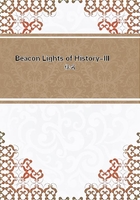
第136章
Savonarola's manner was as effective as his matter. He was a kind of Peter the Hermit, preaching a crusade, arousing emotions and passions, and making everybody feel as he felt. It was life more than thought which marked his eloquence,--his voice as well as his ideas, his wonderful electricity, which every preacher must have, or he preaches to stones. It was himself, even more than his truths, which made people listen, admire, and quake. All real orators impress themselves--their own individuality--on their auditors. They are not actors, who represent other people, and whom we admire in proportion to their artistic skill in producing deception. These artists excite admiration, make us forget where we are and what we are, but kindle no permanent emotions, and teach no abiding lessons. The eloquent preacher of momentous truths and interests makes us realize them, in proportion as he feels them himself. They would fall dead upon us, if ever so grand, unless intensified by passion, fervor, sincerity, earnestness. Even a voice has power, when electrical, musical, impassioned, although it may utter platitudes. But when the impassioned voice rings with trumpet notes through a vast audience, appealing to what is dearest to the human soul, lifting the mind to the contemplation of the sublimest truths and most momentous interests, then there is REALeloquence, such as is never heard in the theatre, interested as spectators may be in the triumphs of dramatic art.
But I have dwelt too long on the characteristics of that eloquence which produced such a great effect on the people of Florence in the latter part of the fifteenth century. That ardent, intense, and lofty monk, world-deep like Dante, not world-wide like Shakspeare, who filled the cathedral church with eager listeners, was not destined to uninterrupted triumphs. His career was short; he could not even retain his influence. As the English people wearied of the yoke of a Puritan Protector, and hankered for their old pleasures, so the Florentines remembered the sports and spectacles and fetes of the old Medicean rule. Savonarola had arrayed against himself the enemies of popular liberty, the patrons of demoralizing excitements, the partisans of the banished Medici, and even the friends and counsellors of the Pope. The dreadful denunciation of sin in high places was as offensive to the Pope as the exposure of a tyrannical usurpation was to the family of the old lords of Florence; and his enemies took counsel together, and schemed for his overthrow. If the irritating questions and mockeries of Socrates could not be endured at Athens, how could the bitter invectives and denunciations of Savonarola find favor at Florence?
The fate of prophets is to be stoned. Martyrdom and persecution, in some form or other, are as inevitable to the man who sails against the stream, as a broken constitution and a diseased body are to a sensualist, a glutton, or a drunkard. Impatience under rebuke is as certain as the operation of natural law.
The bitterest and most powerful enemy of the Prior of St. Mark was the Pope himself,--Alexander VI., of the infamous family of the Borgias,--since his private vices were exposed, and by one whose order had been especially devoted to the papal empire. In the eyes of the wicked Pope, the Florentine reformer was a traitor and conspirator, disloyal and dangerous. At first he wished to silence him by soft and deceitful letters and tempting bribes, offering to him a cardinal's hat, and inviting him to Rome. But Savonarola refused alike the bribe and the invitation. His Lenten sermons became more violent and daring. "If I have preached and written anything heretical," said this intrepid monk, "I am willing to make a public recantation. I have always shown obedience to my church;but it is my duty to obey God rather than man." This sounds like Luther at the Diet of Worms; but he was more defenceless than Luther, since the Saxon reformer was protected by powerful princes, and was backed by the enthusiasm of Northern Germans. Yet the Florentine preacher boldly continued his attacks on all hypocritical religion, and on the vices of Rome, not as incidental to the system, but extraneous,--the faults of a man or age. The Pope became furious, to be thus balked by a Dominican monk, and in one of the cities of Italy,--a city that had not rebelled against his authority. He complained bitterly to the Florentine ambassador, of the haughty friar who rebuked and defied him. He summoned a consistory of fourteen eminent Dominican theologians, to inquire into his conduct and opinions, and issued a brief forbidding him to preach, under penalty of excommunication. Yet Savonarola continued to preach, and more violently than ever. He renewed his charges against Rome. He even called her a harlot Church, against whom heaven and earth, angels and devils, equally brought charges. The Pope then seized the old thunderbolts of the Gregories and the Clements, and excommunicated the daring monk and preacher, and threatened the like punishment on all who should befriend him. And yet Savonarola continued to preach. All Rome and Italy talked of the audacity of the man. And it was not until Florence itself was threatened with an interdict for shielding such a man, that the magistrates of the city were compelled to forbid his preaching.